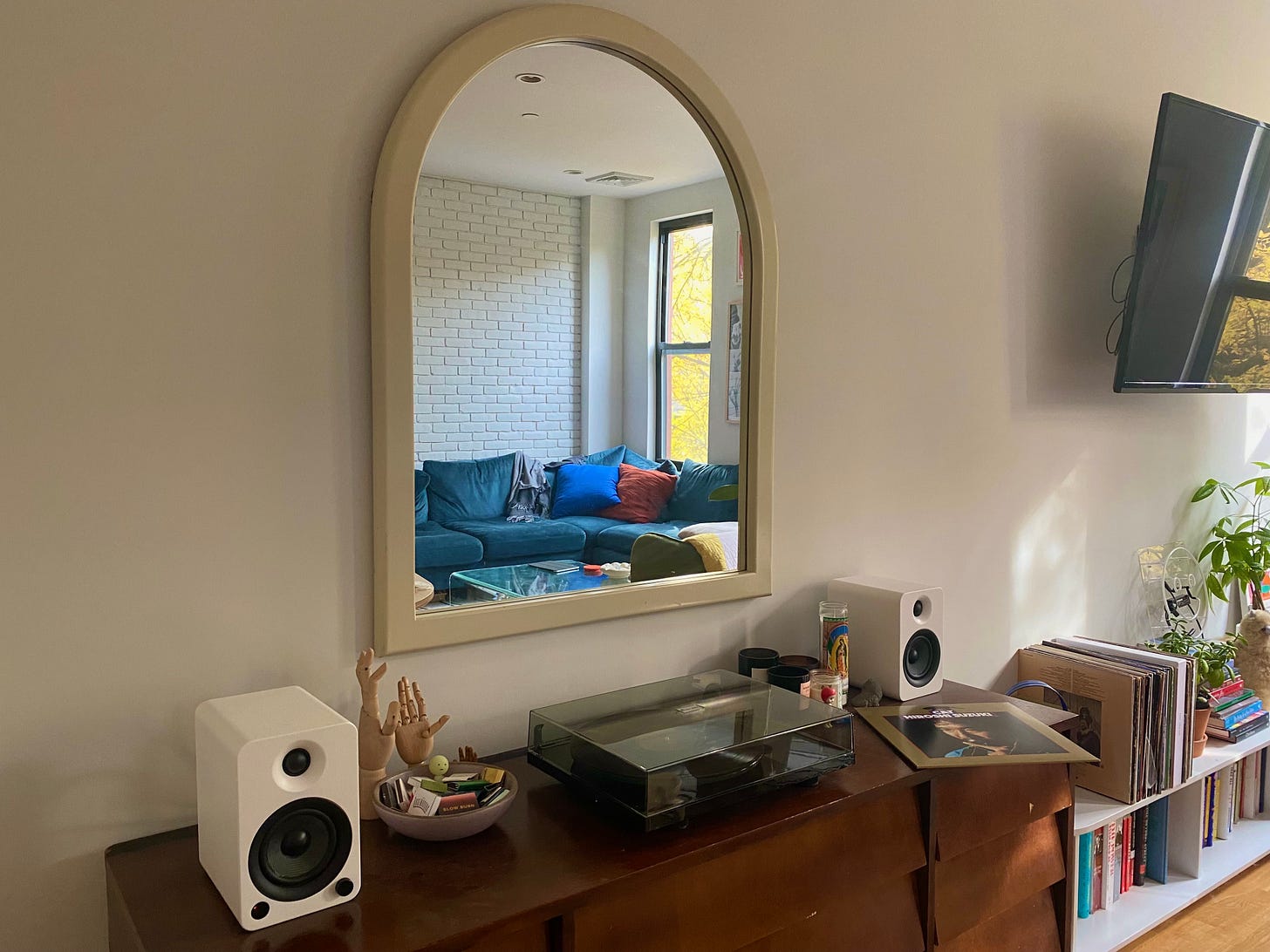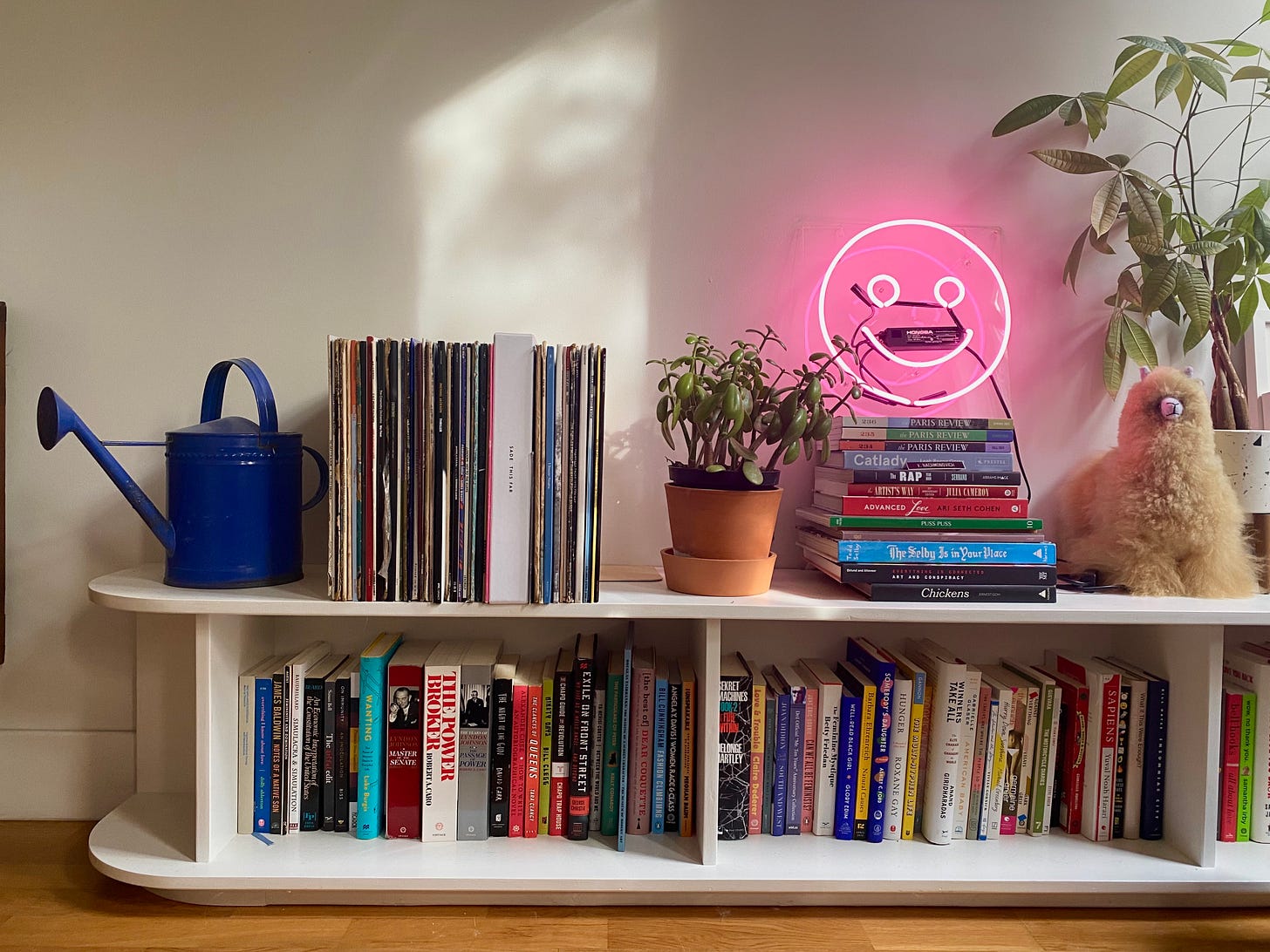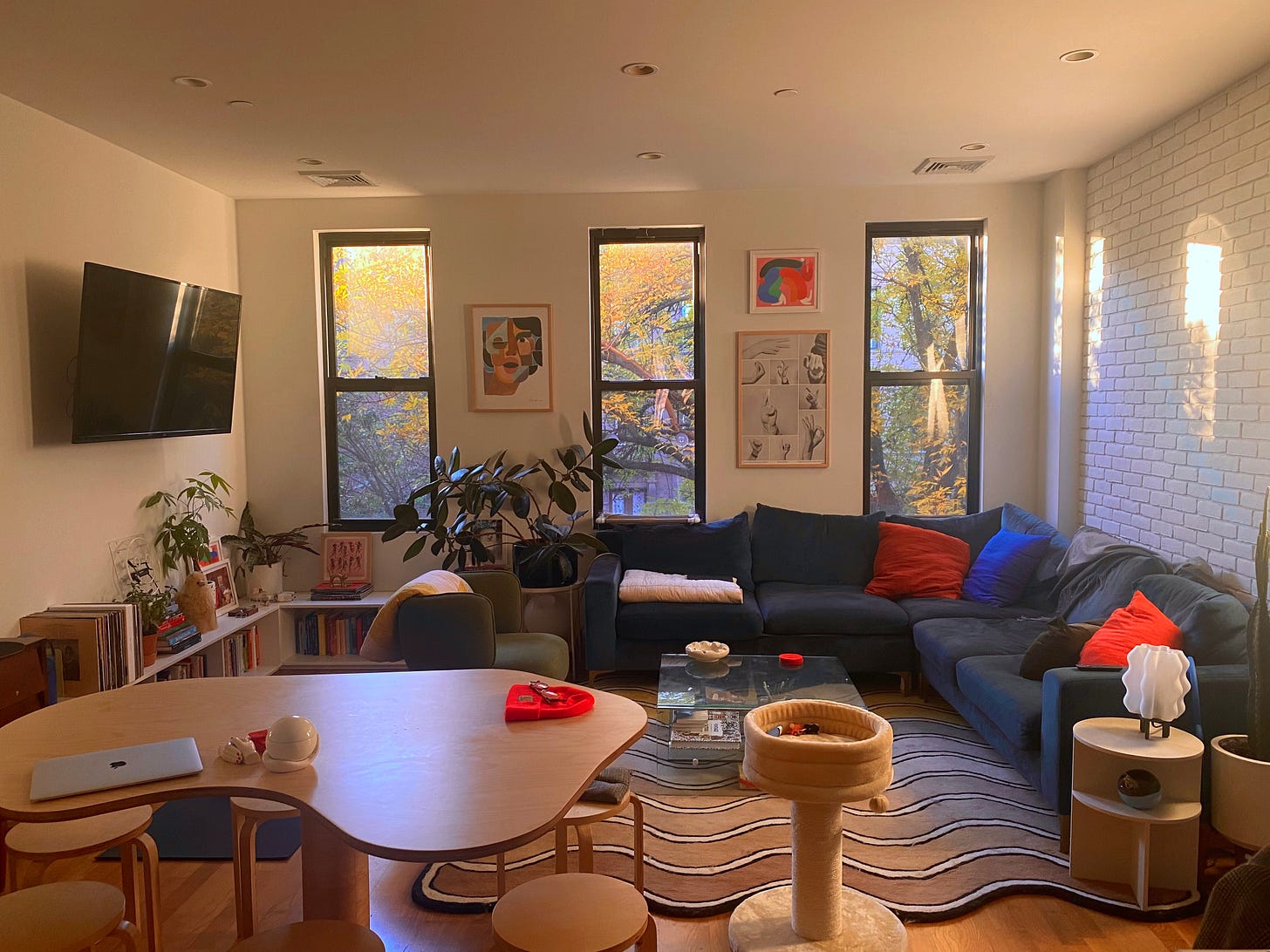#78: In defense of burdens
Maybe Baby is a free Sunday newsletter. If you love it, consider supporting it financially. For $5/mo, you’ll gain access to my Tuesday podcast, my Friday recommendations, and my monthly Q&A column. Maybe Baby is reader-supported, hence the lack of ads and sponsors. Thank you!
Good morning!
This summer, Avi bought us a record player. We’d been talking about getting one for years, but the overwhelming number of choices (and lists of “best choices”) always deterred us. We’d open 75 tabs, pare them down by half, and then conclude we’d do it later. I was relieved when he finally picked something without me, as a surprise for my 32nd birthday. Free from the tyranny of options, it was easy to accept the one he’d chosen as correct, because now it was ours. A glossy black platter with a clear dust cover the color of lightly tinted sunglasses—from the right angle, almost green. We cleared off our wooden credenza and put it right in the middle.
Infected by anti-hipster sentiment of the aughts, I used to think record players in the digital age were for posers—the sorts of people who were nostalgic for clout, or relied on what they could buy (versus who they were) for subcultural caché. When they said things like, “Music sounds so much better on vinyl,” it sounded no less smug to me than claiming to like a band before it was cool. It’s ironic, then, that it wasn’t until I stopped caring about how owning a turntable made me look that I came to see that they were right.
It’s not just that music sounds fuller and warmer on vinyl, it’s that the delivery system changes how I listen to it. Choosing a record from our small collection and taking it slowly out of its sleeve, placing it delicately on the platter and dropping the needle into the correct position—it’s a radically different music experience than one I get from modern streaming. For the next hour, I commit. I listen more carefully, enjoy it more intentionally. The crackling of the older records reminds me I’m hearing a physical process—that it sounds more present because it’s happening right here in my living room. No one’s watching. There is no data.
It was serendipitous that we got the record player in August, when I was feeling listless and depressed. At the time my mental state was illegible to me. After quitting my full-time editing job in March 2020 and starting this newsletter, I’d carefully designed my life to maximize my own flexibility, and thus, I thought, my happiness. Over the course of that first year, I did away with every constraint I could think of, one by one: the 9-5 schedule, the morning alarm, the underpaid freelance work, the negative online comments, the non-stop pressure of non-stop pitching. Even my newsletter, which was rigid in its schedule, was otherwise loose and undefined in its aims, no longer driven by clicks. They were the kinds of changes many people dream of making, if only they had the resources. And there I was, making them, at a loss for how I’d managed to make my life feel emptier in the process.
It sounds a little dramatic, but connecting the two ideas—freedom and emptiness—was key to understanding how I was feeling. And it was the record player, in all its joyful limitations, that helped me see that. I noticed right away how the air in our apartment seemed to change when Avi or I put a record on, as if the very act was a bid to be more present. The impact was less about the records specifically and more how it felt to commit to them—even occasionally feel limited by them, wishing we could skip a song, or wishing we had a different album, but enjoying the experience anyway. I started writing things down in the morning (what I wanted to do) and at night (what I did), and noticed how it made me feel to commit to a certain set of tasks, and later commit my day to memory. These were such simple things, almost embarrassing in their obviousness. But through them I came to see that perhaps in my attempt to unburden my life of constraints, I’d gone too far. That the sinking feeling I’d come to associate with my depression was actually more like floating.
When I monologued about all this on a podcast, a reader named Janie told me about Oulipo, a group of avant-garde French writers who purposely sought out constraints to produce more interesting work. “Notable members included Georges Perec,” they told me, “who famously wrote a novel in French without using the letter E.” This reminded me of my friend Francois, whom I met when I worked at a design agency in my early twenties. He was a Vietnamese creative director known for invoking Eastern philosophy, and he used to talk all the time about constraints—the way, counterintuitively, they tend to lead to better creative work. Deadlines, budgets, guardrails: as long as they weren’t too imposing, they helped shape, rather than hinder, ideas. Research bears this out. And on some level I’ve always known this—almost no writing gets done without a deadline—but after leaving my last job due to its particular constraints, it was hard to wrap my head around the idea that I needed some of them back.
The first weekend Avi and I owned the turntable, we walked to a record shop and poked eagerly through the bins. The collection of rare techno, funk, and disco records was mostly unknown to us. We bought a few on gut instinct and walked home curious to hear what “Cat” by Hiroshi Suzuki sounded like (turns out he’s a Japanese jazz trombone player from the 70s). On the way, I remember feeling a little sad that we hadn’t found something we recognized, but in hindsight our ignorance was fitting. It was good, even prescient, to be a little constrained, no answers at our fingertips.
As if in direct opposition to the choice paralysis we felt while buying one, owning a record player has impressed upon me almost urgently the value of limiting one’s scope. I still stream music, but the turntable scratches a completely different itch: the desire to experience my own life away from the seeming limitlessness of online existence, and the watchful gaze implied by participating. To invite borders and boundaries. It’s hard to say whether this is a product of my age or whatever phase of societal decline we’re currently in, but since we got it, I haven’t stopped thinking about the more diminutive aspects of my life, and how good and natural they are. I do not need to be widely known, admired, or understood, nor does my world need to expand infinitely into the metaverse; rather, it needs to contract.
For me, that meant tying myself down a little bit more. I took on some outside freelance work. I signed up for a local sewing class and writing workshop. I finally hung the mirror in my living room, no longer tolerant of my own uncertainty around how to do it. In the same vein: I put up some art, hung some shelves, finally decided how I wanted to organize my books and then did it. I kept journaling. By October I was saddled by deadlines on a level I knew was unsustainable, but I noticed that my house had never been cleaner, my confidence in my own capability never sharper.
This isn’t a morality tale about productivity. I was doing a lot before, just differently. What mattered was that I was pushing myself toward structure and commitment, rather than away from them. Consequently, my life felt smaller, the possibilities before me slightly narrower. It was a paradox, then, that I finally felt like I could breathe. I don’t see this state as a permanent aim (I am not the pope), but it’s nice, every once in a while, to remember that frictionlessness is not the key to life it’s often made out to be. Constraints have a way of dulling the ache of uncertainty. Like picking one of 20 records to play, you don’t waste much time wondering which is the right choice, or whether you should change it once you’ve started. Once it’s on the platter, the needle sliding idly across its well-worn grooves, you’re committed, you’re locked in, for better and for worse.
Pick of the week: This win for the NYC taxi drivers who were on a hunger strike this past week demanding relief for their paralyzing debt due to exploitative industry practices. Here’s a video of them dancing after they won, which might make you cry. “America Is in the Midst of a Dramatic Labor Resurgence,” reported The New Republic last month. “What business calls a ‘labor shortage’ is really labor power in action.”
Runner-up: One of my own newsletters reworked and republished for The Guardian. It was refreshing to work with an editor on something I’d written for Maybe Baby. I think it made the essay a lot better! Btw I didn’t choose the headline or feature image so don’t judge...lol.
Pic of the week: All the leaves that finally turned yellow on the tree outside my window, and the warm light now cast on my living room in the morning.
Read my full 15 things here.
Thanks for reading!
Haley
This month a portion of subscriber proceeds will be redistributed to Labor Notes, “a media and organizing project that has been the voice of union activists who want to put the movement back in the labor movement since 1979.”
Give me feedback • Subscribe • Request a free subscription • Ask Dear Baby a question






